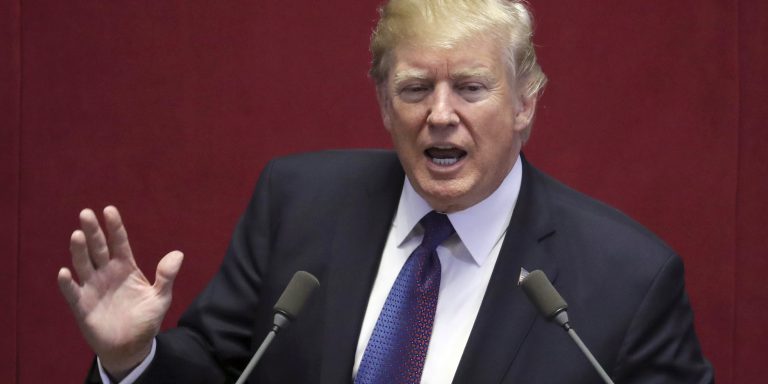INTELBRIEF
November 9, 2017
TSC IntelBrief: President Trump’s Speech to North Korea

• On November 8, U.S. President Donald Trump delivered a speech in Seoul that was aimed directly at North Korea’s leadership.
• The President called North Korea ‘a hell no one deserves’ and warned Pyongyang to not ‘underestimate’ or ‘try’ the U.S.
• Despite President Trump’s demands, North Korea is not going to agree to a ‘total denuclearization’ as a precondition for negotiations, or likely for any reason at all.
• President Trump left Seoul for China, where President Xi Jinping’s help is crucial in addressing the developing crisis with North Korea.
On November 8, U.S. President Donald Trump delivered a sharp message to North Korea, in a speech before South Korea’s National Assembly. Whether the speech can generate momentum towards a peaceful resolution of the North Korean nuclear crisis — or even a lessening of tensions — is unclear. Decades of concerns over North Korea’s steady path towards credible and reliable nuclear weapons and delivery systems are now at their highest levels, and it is unrealistic to expect much from a speech that failed to offer major shifts in Washington’s approach to Pyongyang. Instead, President Trump’s address rehashed the well-known history of the conflict between the two Koreas — juxtaposing the South’s success with the ‘hell’ of the North — along with warning North Korea’s ruling regime not to ‘underestimate’ the United States.
Given President Trump’s previous public mocking of North Korean leader Kim Jong-Un as ‘Little Rocket Man’, expectations were such that a lack of ad hominem attacks was seen as a major development. In addition, President Trump made no overt threats to launch a unilateral pre-emptive strike against Pyongyang, which in the current environment of overheated rhetoric on all sides, counts as a diplomatic olive branch. However, there were some diplomatic sparks. The President addressed remarks directly to Kim Jong-Un, saying his country wasn’t the paradise Kim’s grandfather, North Korean founder Kim Il-Sung, had envisioned. North Korean state media responded with a rebuke of its own, saying Pyongyang didn’t ‘care about what that mad dog may utter because we've already heard enough.’
Before making his speech, President Trump pushed Japan and South Korea to buy more U.S. military hardware; both to help the countries protect themselves from North Korea and to help U.S. workers. A Presidential tweet lauding defense sales as a plus for the U.S economy did not go unnoticed by Pyongyang, which accused Washington of ‘challenging us with the most vicious and demeaning provocations.’ President Trump also called for increased defense spending at home, asking Congress for an additional $4 billion for missile defense, on top of the $9.9 billion already requested for fiscal year 2018.
On November 8, President Trump left South Korea for China and meetings with President Xi Jinping. Trump has repeatedly singled out China as the most able actor capable of changing North Korea’s behavior, at least on those occasions when Beijing is willing to apply pressure. China accounts for 90% of North Korea’s trade, but while its influence with Pyongyang is substantial, it’s not without its limitations and frustrations. President Trump’s demands notwithstanding, it is difficult to overstate just how committed the North Korean regime is to developing a nuclear program as a permanent deterrent against the regime change plots it fears. Meanwhile, China’s main goal is to avoid a North Korean collapse, either through a war between Washington and Pyongyang or economic sanctions that would further devastate North Korea’s economy. Helping the U.S. reduce tensions on the Korean peninsula is a lesser priority.
President Trump will likely have a difficult task getting Beijing to make substantial changes in its approach to the issue, especially given U.S. insistence that talks with North Korea be predicated on Pyongyang giving up its ballistic missile and nuclear programs before getting a seat at the table.
.
For tailored research and analysis, please contact: info@thesoufancenter.org
.
.